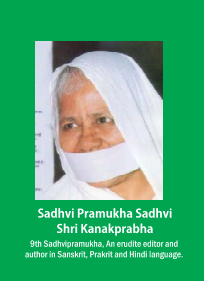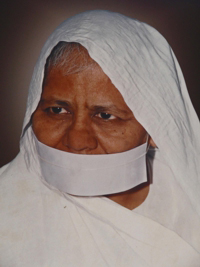
Acharya Tulsi - Fifty Years of Selfless Dedication
Man has infinite potentialities which can be realized only if they become a part of everyday living. A life without an aim is a life without any potentiality. When life has a purpose, and a desire for change, new possibilities emerge and new hopes arise. Acharya Tulsi, propounder of Anuvrat, was a great roving ascetic. His long and ceaseless marches had a special purpose and therefore every step of his brought it nearer, at the same time yielding the desired results. He embarked on this great course at the young age of eleven and kept walking ceaselessly. Reduced to figures, his walking had crossed the hundred-thousand-kilometre mark. Area-wise he had covered the entire length and breadth of the country from Punjab lo Cape Comorin and from Kachha to Calcutta.
His marches have set a new record. Besides travelling, these marches had other aims like making mass contacts, preaching, studying, producing literature and engaging in other creative activities. Free from all prejudices and pre¬possessions, his appeal transcended the barriers of class and community and thus made it possible for his ideas to benefit large sections of society.
During his perambulations Acharyashree used to camp in all kinds of places from big cities and townships to small villages. This gave a broad spectrum of people - children, villagers, casual labourers, factory and office workers, teachers, traders, industrialists, politicians and religious leaders - an opportunity to meet him. It is not infrequently that during such meetings things and events took place which eventually turned out to be memorable. It is some of these unforgettable incidents which are going to be narrated in this memoir.
One Can Be Religious Even without Rituals
It was the last week of September, 1966 when Acharyashree was camping in Ahmedabad. Sitting beside him was Mr Narayan Rao Patil, Chairman, Ahmedabad Housing Society, and an ex-minister in the Maharashtra Government. On being exhorted by the Acharya to lead a religious life Narayan Rao Patil pleaded lack of time even though he had an inclination towards it.
At this, the Acharya wanted him to think whether one needed extra time to be religious. Seeing Patil's impatience for the correct answer Acharyashree added, 'It is precisely for busy people like you that we have reinterpreted religion. 'I am all too eager to know it,' said Patil. The Acharya put it succinctly in the following words: Religion means purity of life. To be religious you need neither be a sanyasi nor practise rituals. You should honestly try to show yourself as you are and let complete sincerity inform all your actions. You should eschew deception and oppression. It is all that religion is. Do you lack time for doing these?
Patil was literally overwhelmed. He felt as though an inner vacuum in him had been filled. With a newly awakened self-assurance he said to the Acharya, 'How effortlessly you have won me over to religion!
How Can I Have the Right to Speak?
Pallavaram is a suburb of Madras. Acharyashree chose it for his weekly stay. During this sojourn many programmes were planned. One of them was a seminar on Anuvrat on November 26. The Food Minister of Tamilnadu, Mr K.A. Madiya Algan, was to be the chief speaker. He came to the venue of the seminar from his residence by car, reading some literature on Anuvrat on the way. His expression grew somewhat serious on reading the eleven rules (vows) of Anuvrat.
He had a lighted cigarette in his hand. After a few moments he extinguished it and gave away the cigarette packet to the driver. The latter felt intrigued. He asked Mr Algan as to what was the matter. Mr Algan said, 'Unless I practise it how can I have the rightto speakon Anuvrat? Mere lecturing is meaningless.' The moral fibre of the nation can be much finer and stronger if all speakers follow Mr Algan's example.
Gift Away Your Bad Habits to Me
On April 2 Acharya shree was sojourning at St Joseph High School in the Ankmali village of Kerala. He left the place in the afternoon and soon his caravan was marching along the highway. On the way a few passing Christians stopped to talk to him. The conversation began after the introductions were over. Before resuming his march Acharyashree asked for dakshina (present or gift given to a priest or preceptor). The Christians searched through their pockets but finding them empty one of them humbly said, 'We would love to offer you dakshina and it is our duty too, but right now we are returning from the Church and have nothing on us."
Acharyashree's penetrating eyes were fixed on their pockets. He remarked that the pockets looked full. One of the men took out a packet of cigarettes and a lighter from his pocket and showed them to the Acharya. The latter said, 'Can't you present these to me?' For a moment all the men were taken aback. Utterly surprised, some of them said, 'You are a sanyasi. How can you smoke?' The Acharya smiled and said, 'I don't smoke but I do try to prevent smokers from doing so. I don't accept money or any other gift as dakshina but ask of the people to gift away their bad habits to me. Hearing it the men were overjoyed. But how could they give up the old habit of smoking? After a little hesitation they said, 'We simply can't give it up at one go. But we seek your blessings so that we are gradually able to get rid of it.'
Short Story
BANK ACCOUNT
Imagine there is a bank, which credits your account each morning with Rs 86,400, carries over no balance from day to day, allows you to keep no cash balance, and every evening cancels whatever part of the amount you had failed to use during the day. What would you do? Draw out every pence, of course!
Well, everyone has such a bank. Its name is Time.
Every morning, it credits you with 86,400 seconds. Every night it writes off, as lost, whatever of this you have failed to invest to good purpose. It carries over no balance. It allows no overdraft. Each day it opens a new account for you. Each night it burns the records of the day. If you fail to use the day's deposits, the loss is yours.
There is no going back. There is no drawing against the "tomorrow."
Therefore, there is never not enough time or too much time. Time management is decided by us alone and nobody else. It is never the case of us not having enough time to do things, but the case of whether we want to do it.
Conclusion:
"A good character is the best tombstone. Those who loved you and were helped by you will remember you when forget-me-nots have withered. Carve your name on hearts, noton marble."
 Sadhvi Pramukha Mahashramani Kanakprabha
Sadhvi Pramukha Mahashramani Kanakprabha